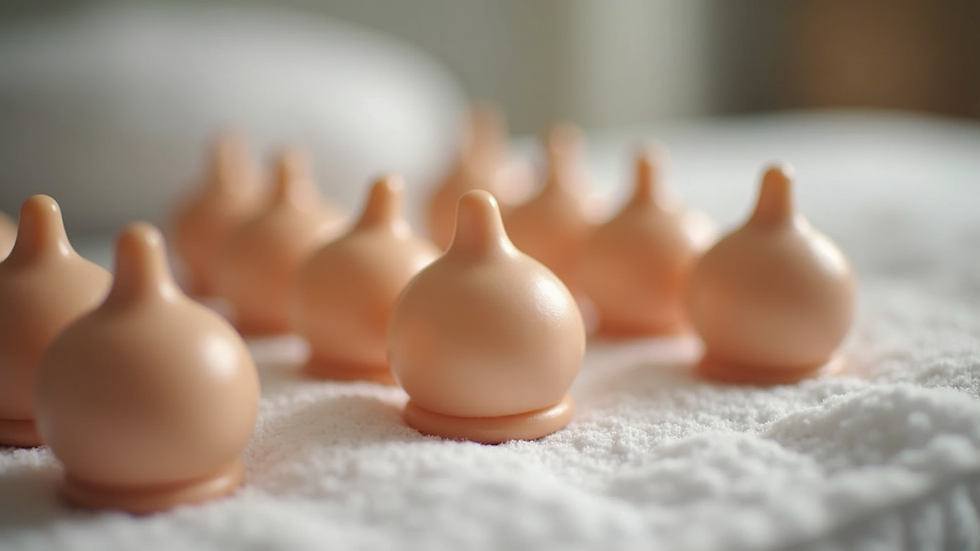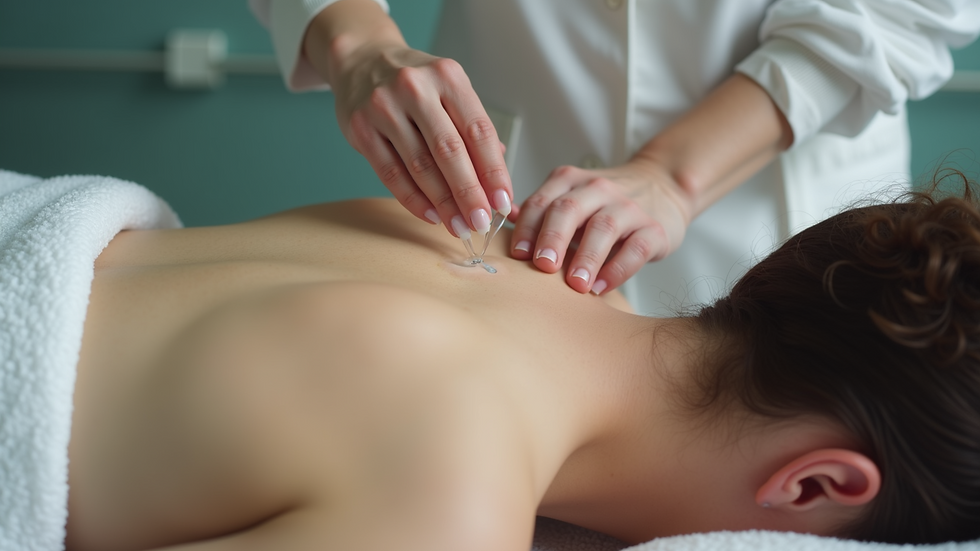Understanding the Science Behind Cupping Therapy
- emmasguthrie3

- May 12, 2025
- 4 min read
Cupping therapy is an ancient healing practice that has gained popularity in modern alternative medicine. Its roots trace back thousands of years, with origins in Traditional Chinese Medicine (TCM) and a long history in various cultures. In recent years, athletes have adopted it for its supposed benefits, but what does science say about cupping therapy? In this post, we will explore the mechanics, benefits, and physiological effects of cupping therapy.
What is Cupping Therapy?
Cupping therapy involves placing suction cups on the skin to create a vacuum effect. This technique is believed to promote blood flow, relieve muscle tension, and facilitate healing. The cups can be made from various materials, including glass, bamboo, and silicone. During a session, the practitioner will either place the cups on areas with tension or use them in a method called "gliding," where they move the cups along the skin.

Different styles of cupping exist, including dry cupping, wet cupping, and fire cupping. In dry cupping, suction is applied directly to the skin, while wet cupping involves making small incisions for drawing blood. Fire cupping uses heat to create the suction. Each method has its practitioners and advocates, but they all aim to achieve similar therapeutic goals.
How Does Cupping Therapy Work?
Cupping therapy is thought to work through several mechanisms. The primary goal is to create a vacuum effect, pulling the skin and underlying tissues into the cup. This process can increase blood circulation in the treated area, which may accelerate healing. Studies suggest that improved blood flow enhances oxygen delivery and nutrient supply, while simultaneously removing metabolic waste.
For many patients, the sensation is described as a deep tissue massage, inducing relaxation and comfort. Afterward, individuals often report feeling lighter and less tense, which can lead to an overall sense of well-being.
The Role of Pressure and Suction in Cupping
The pressure created by the suction in cupping therapy alters the local vasculature. Blood vessels expand, and circulation increases, which may help in:
Reducing inflammation
Alleviating pain
Enhancing cell repair
However, it’s important to note that while many users swear by its effectiveness, scientific studies on these benefits are limited. More research is needed to substantiate these claims fully.

What Toxins Does Cupping Remove?
Cupping therapy is believed to aid in detoxifying the body by expelling toxins trapped in muscles and tissues. This process is achieved through the stimulation of blood circulation and lymphatic drainage. When suction is applied to the skin, it's thought that the underlying tissues are stimulated to release stored toxins.
Some of the toxins that cupping may help expel include:
Heavy metals
Lactic acid
Chemicals from processed foods
Hormones and metabolites
While some practitioners advocate that cupping can boost overall detoxification and support health, it's essential to approach this claim with caution. Scientific understanding of detoxification is still evolving, and the body has its efficient mechanisms for eliminating toxins.
Benefits of Cupping Therapy
Though comprehensive scientific research is still needed, early anecdotal evidence suggests several potential benefits of cupping therapy. Here are some commonly reported advantages:
Pain Relief: Many people turn to cupping therapy to relieve chronic pain, especially in the back, neck, and shoulders. Some studies have shown a positive correlation between cupping sessions and reduced pain levels.
Muscle Relaxation: Cupping may help alleviate muscle tension and promote relaxation, making it a popular choice among athletes and fitness enthusiasts.
Improved Skin Health: The increased blood flow from cupping is said to give the skin a healthy glow. Additionally, some practitioners claim it can help treat acne, eczema, and other skin conditions.
Boosted Immunity: Some proponents suggest that cupping can enhance the immune system, possibly by promoting the release of white blood cells and other immune factors.
While these claims seem promising, it's essential to understand that individual experiences may vary. As with any therapy, it's advisable to consult with a healthcare professional before trying cupping therapy.

Who Can Benefit from Cupping Therapy?
Cupping therapy can be beneficial for a wide range of individuals, including:
Athletes: Many athletes use cupping to enhance their performance, speed up recovery, and relieve muscle soreness.
Individuals with Chronic Pain: People suffering from conditions like arthritis, fibromyalgia, or chronic back pain often report relief following cupping therapy.
Those Seeking Relaxation: Cupping can serve as a form of stress relief for anyone looking to unwind.
However, it is crucial for certain individuals to seek medical advice before undergoing the treatment. Pregnant women, people with bleeding disorders, and those with certain skin conditions should consult their healthcare provider.
Final Thoughts on Cupping Therapy
Cupping therapy may offer a plethora of potential benefits, including pain relief, improved skin health, and relaxation. While diving into this ancient practice, remember that not every treatment will work for everyone.
If you're intrigued by the science behind cupping therapy, consider consulting with a professional who understands its nuances. Proper guidance can ensure that your experience is safe and beneficial. For more information on how cupping therapy can help you, explore the potential cupping therapy benefits.
By understanding the science behind cupping therapy, you can make more informed decisions regarding your health and wellness.




Comments